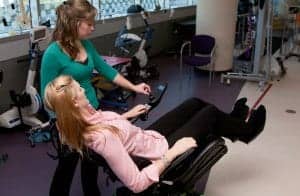
A news release from the University of Michigan Health System notes that the center will be comprised of researchers and clinicians from U-M’s departments of Physical Medicine and Rehabilitation and Internal Medicine, College of Engineering, College of Pharmacy, School of Public Health and the School of Information. The researchers will investigate how technology that is familiar to younger groups, including mobile devices and video games, can be used to implement types of support, reminders, and motivation for young adults with spina bifida, cerebral palsy (CP), and other disabilities.
The new tools, researchers say, are intended to leverage research in artificial intelligence and cognitive science in order to assist adolescents and young adults in developing a wide range of skills.
These youth are transitioning from childhood to the responsibilities of adult living, points out Michelle Meade, PhD, RERC, associate professor in the Physical Medicine & Rehabilitation Department, U-M Medical School, member of the Institute for Healthcare Policy and Innovation.
Meade adds that they also, “face other obstacles from their injury or disability that makes this a critical period for developing skills they need to be independent…We are using a medium we know this age group accepts and embraces as a way to implement self-management programs to set them up for success.”
Meade will reportedly lead a clinical trial next as part of the center. The trial will assess how a U-M developed video game, SCI HARD that can be played using hands or a mouth stick, may improve health behaviors among adolescents with spinal cord dysfunction. Within the game, players will engage in doctor office visits, therapy to build muscle, have the opportunity to learn how to interact with other people, learn how to drive an accessible car, and learn how to get information they need in order to progress.
The release states that additional projects that will be funded by the grant include developing apps and other tools engineered to assist patients in reporting daily activities and track trends over time via smart phones and other mobile devices. Project researchers include Nancy Hansen Merbitz, Ph.D. of U-M’s PM &R and Charles Merbitz, Ph.D., BCBA-D, consultant with Behavior Development.
A project led by Mark W. Newman, PhD, and Mark Ackerman, PhD, will also support the development of a cloud-based mobile system called Spinal Cord Injury Living and Learning System (SCILLS) that offers a virtual coaching program to motivate patients to follow through on self-care.
RERC co-director Edmund Durfee, PhD, professor in the U-M Computer Science and Engineering Division and member of the Artificial Intelligence Laboratory, emphasizes the importance of the research, noting, “Technology offers new opportunities to develop and implement strategies that can be incorporated into healthcare practice and improve the lives of individuals with disabilities.”
Source: University of Michigan Health System





